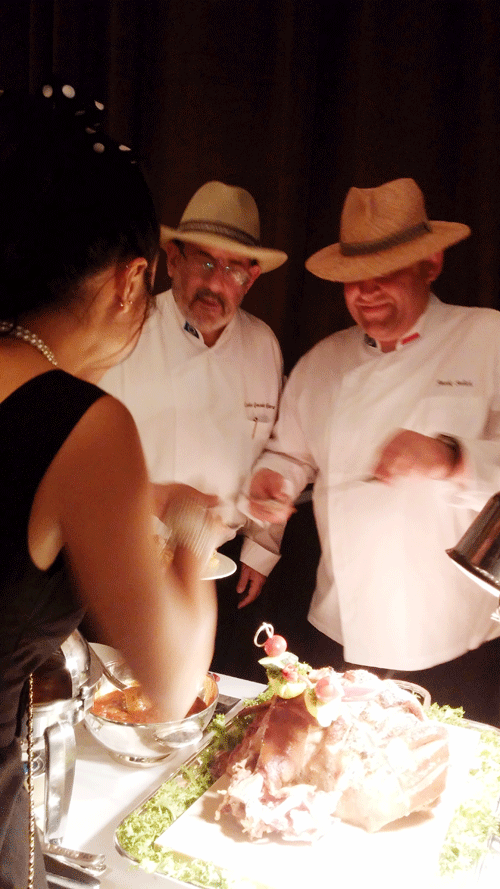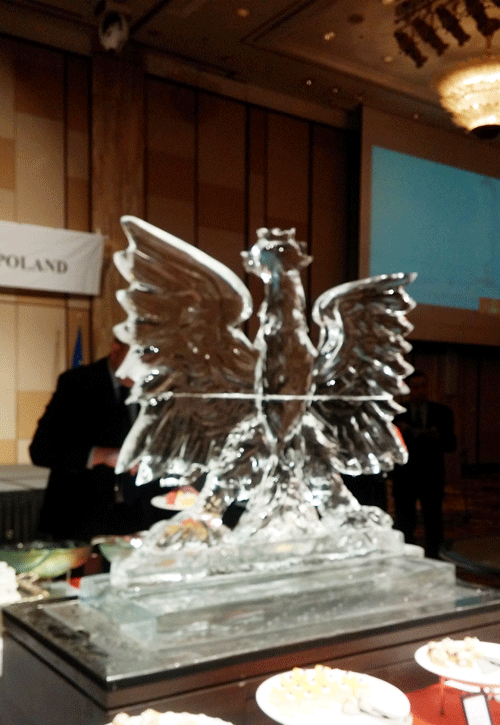First in Europe, second in the world after the United States
Ambassador and Mrs. Krzysztof Majka of the Republic of Poland in Seoul hosted a reception at the Millennium Seoul Hilton on May 14, 2014 with the presence of Minister of Agriculture and Rural Development Marek Sawicki of Poland and President Wieslaw Rozanski of the Union of Produces and Employers of Meat Industry. It was to celebrate the Constution Day of Poland of May 3, 1791, which was the first liberal constitution of modern Europe and the second in the world following the one in the United States.
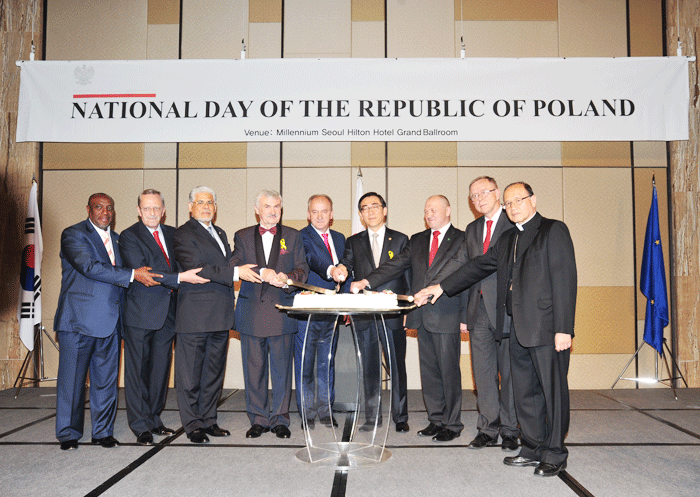
There were many distinguished guests in attendance at the party from both Korean society and the foreign community as well as from the Seoul Diplomatic Corps (SDC).
From the Korean side came Vice Minister of Foreign Affairs Cho Tae-yul and many other dignitaries representing the government, busienss, cultural and academic circles as well as the media (eg., Publisher-Chairman Lee Kyung-sik of The Korea Post*).
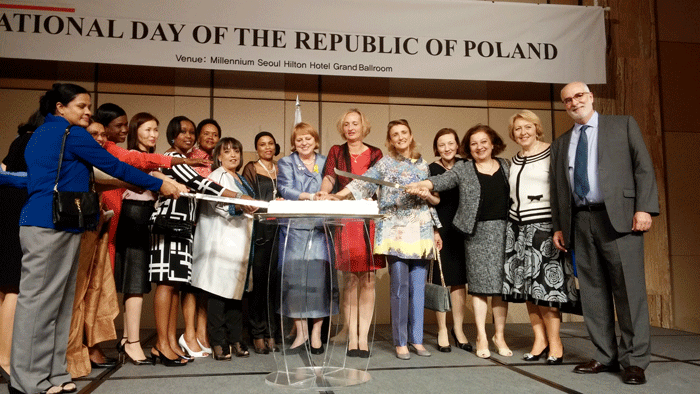
From the SDC came many foreign mission chiefs and other senior members of the SDC, who included Ambassadors Md. Enamul Kabir of Bangladesh, Natallia Jhylevich of Belarus, Petar Andonov of Bulgaria, Grecia Fiodalicia Pichardo of Dominican Republic, Dibaba Abdetta (Dr.) of Ethiopia, Tomasz Kozlowski of Delegation of The Europan Union, Nikoloz Apkhazava of Georgia, Archbishop Osvaldo Padilla of Holy See, Sergio Mercuri of Italy, Ngovi Kitau of Kenya, Dato Rohana binti Ramli of Malaysia, Jose Luis Bernal of Mexico, Mohammed Chraibi of Morocco, Konstantin V. Vnukov of Russia, Luis Arias Romero of Spain, Tissa Wijeratne of Sri Lanka, Hemani Filomena Coelho Da Silva of Timor Leste, Vasyl Marmazov of Ukraine and Huu Chi Pham of Vietnam.
This year there were some special lady guests involved in charity and benefit activities, namely those of the Korean Red Cross (KRC). They were Chairperson Kim Yoon-Hee of the Women’s Advistory Committee for Volunteers of the KRC (wife of President Park Jae-Kyu of Kyungnam University, who is the top authority in Korea in inter-Korean relations), Vice Chairperson kim Sun-Hyang of the KRC and Mrs. Lee Sun-jin (wife of Chairman Sung Ki-hak of Youngone Corporation). They are all very prominent ladies in Korea for the charity and benefet activities, including the ancestor of Chairman Sung Ki-hak of Youngone named Sung Chan-young who succeeded in cultivating Korean onions in Changnyeong, Gyeongsangnam-do in 1909 and made a big donation for the peasants to cultivate them. Even today, Changyeong is noted for top-quality Korean opinion thanks to the support and assistance given by Donor Sung.
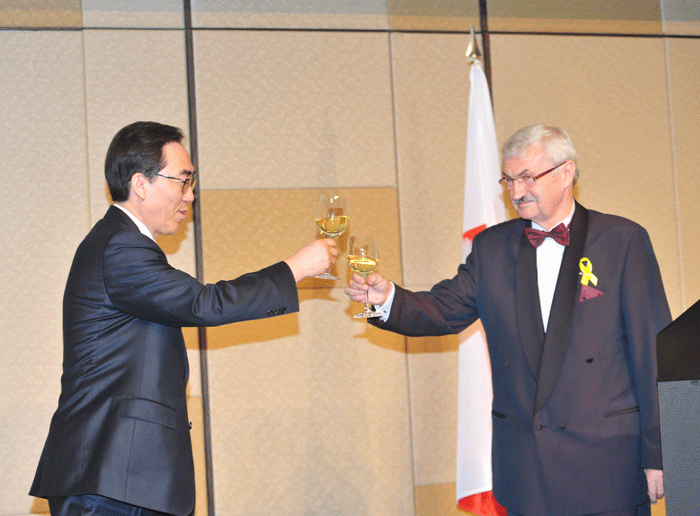
Another distinction of the reception from other parties was the plentiful traditional foods and beverage of Poland prepared by the Polish chefs flown in from Poland for that purpose. The Polish foods had a unique taste that more than met the palatate of the demanding Korean epicureans.
The celebration began with offering of silent prayers for the victims of the Sewol Ferry Case. Ambassador Majka said, “We are very mindful that the Polish National Day is celebrated at a time of mourning for the people of Korea. Therefore, before I start my National Day address I would like to offer, on the part of the Polish people, condolences for the victims of the ferry boat disaster and ask Speaking to the guests in a welcome speech, Ambassador Majka said in part: “The May 3rd Constitution changed the political system in Poland.
Following the American pattern it established three independent branches of government ? executive, legislative and judiciary. Such a division created a modern and democratic country, the first of its kind in Europe.” (See excerpts from the speech toward the end of this Article.)
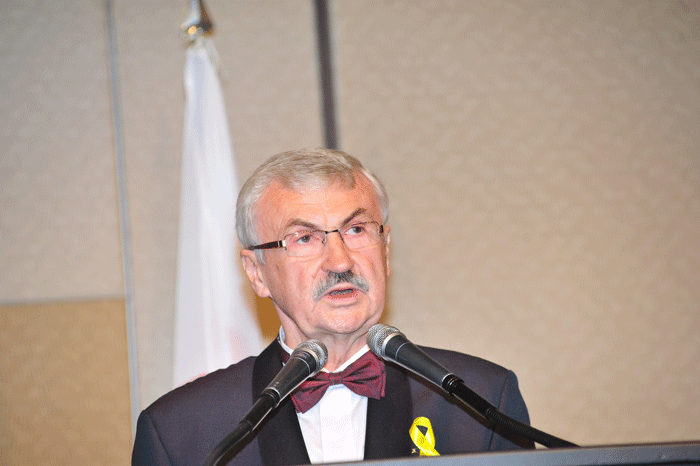
Ambassador Majka’s speech was followed by a return speech by Vice Minister of Foreign Affairs Cho Tae-yul of Korea. He said in part: “Being surrounded by big powers, Poland has suffered from the countless hardships and ordeals. Nevertheless, the people of Poland never lost their national identity, lived up to the spirit of May 3rd Constitution, and eventually succeeded in building today’s Poland rejoicing in peace and prosperity. For this, I express my profound respect to the people of Poland.” (See excerpts from the speech at the end of this Article.)
Excerpts from the welcome speech by Ambassador Majka:
It is my great honor and pleasure to warmly welcome all of you, gathered here to mark the Constitution Day of Poland. Today, we proudly celebrate the anniversary of the adoption of the Poland’s first Constitution which took place on 3rd May, 1791. This was the first liberal constitution in Europe and the second in the world, following the United States Constitution of 1787. The May 3rd Constitution changed the political system in Poland. Following the American pattern it established three independent branches of government ? executive, legislative and judiciary. Such a division created a modern and democratic country, the first of its kind in Europe.
However, it brought us also the tragic consequences. Our then neighbors Russian Empire, Kingdom of Prussia and Habsburg Austria banded together to stop from further spreading what they called the Polish cancer of freedom. Its adoption finally led to the Third Partition of Poland in 1795 and as a consequence of that Poland was removed from the map of Europe and reinstated only after 123 years. Regardless of it for Poles the May 3rd Constitution signifies the spiritual and moral renovation of the nation and is regarded as a milestone in the Polish history.
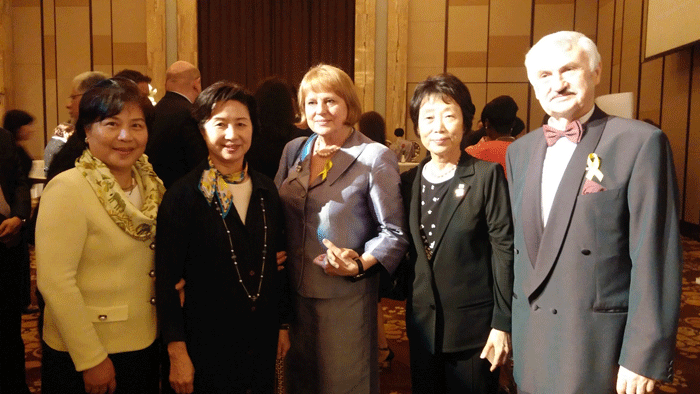
Let me now say a few words about Poland’s international environment and economic status.
Since 25 years Poland is a leader in economic growth in Europe. Over that period, Polish export have increased tenfold. During the last 10 years only, Poland’s GDP skyrocketed, increasing by nearly 50% (48.7%). Even in 2008-2013, during the depth of the global financial crisis, our economy grew by 20% - by far the best result in the European Union. In 2012, cumulative foreign investments in Poland were worth 178 billion Euros, almost quadrupling since 2003. In the recent World Bank report it was concluded that Poland has just had probably the best 20 years in more than one thousand years of its history.
Korea is a very important partner for Poland and vice versa. Poland is Korea’s largest trade partner and investment destination in Central Europe. Polish and Korean high - level government officials continue to meet at both bilateral and international summits, jointly shaping mutually beneficial policies. Last year was particularly fruitful in this respect. President Park Geun-hye and Polish President Bronislaw Komorowski, visiting Seoul on the state visit, held a summit meeting on October 22-nd. The leaders acknowledged that relations between Poland and Korea have been expanded across many areas since the establishment of the diplomatic relations in 1989. They decided to upgrade the Poland-Korea relationship to a “strategic partnership” and agreed on expansion of mainly trade and investments. Both leaders expressed the conviction their Poland and Korea will keep working together to further boost their cooperation.
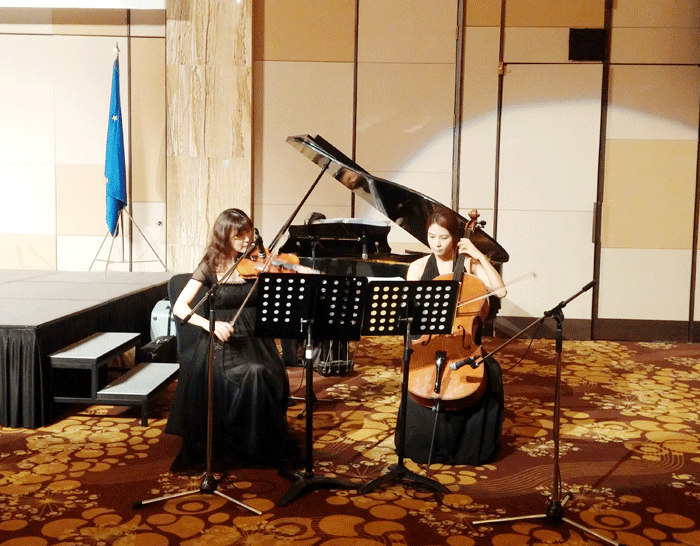
Excerpts from the speech of Vice Minister Cho:
I am delighted to be here with you today on this auspicious occasion of commemorating Poland's May 3rd Constitution Day, and say a few words of congratulations on behalf of the government and people of the Republic of Korea.
The constitution of Poland, enacted 223 years ago, is the second oldest constitution in modern history only after that of the United States and the first ever in Europe. This is not only a proud achievement of the Polish people, but also a significant legacy of mankind which has moved history forward.
Being surrounded by big powers, Poland has suffered from the countless hardships and ordeals. Nevertheless, the people of Poland never lost their national identity, lived up to the spirit of May 3rd Constitution, and eventually succeeded in building today’s Poland rejoicing in peace and prosperity. For this, I express my profound respect to the people of Poland.
“To be defeated and not submit, is victory; to be victorious and rest on one's laurels, is defeat.” This is a quote from a speech made by Poland's independence hero and first marshall, Jozef Pilsudski. What an eloquent testament to the great strength of the Polish people! Trial after trial, Poland has developed into a more mature and stronger nation throughout its history.
Poland's value from the perspective of world history is not confined to the fact that it has maintained its independence overcoming all the challenges it has been faced with. As illustrated by the famous remarks of Poland’s former President Lech Walesa, “The fall of the Berlin Wall started in the shipyards of Poland.” Poland's fight for democracy in the 1980s changed the tides of the contemporary world history.
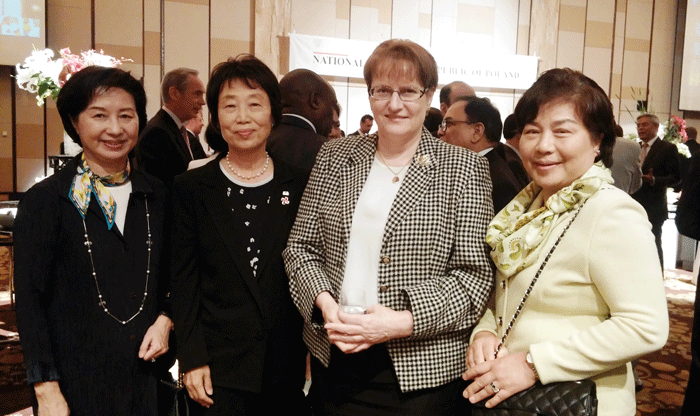
The history of Korea--a geostrategic outpost in Northeast Asia--has many parallels to that of Poland. And the special friendship between our two countries stems from a sense of solidarity of sharing these historical experiences.
With their common national character of tenacity and shared aspiration for peace and prosperity, Poland and Korea have emerged as a thriving democracy and market economy in East Europe and Northeast Asia respectively, and will remain close partners as ever walking on the road towards a bright future together.
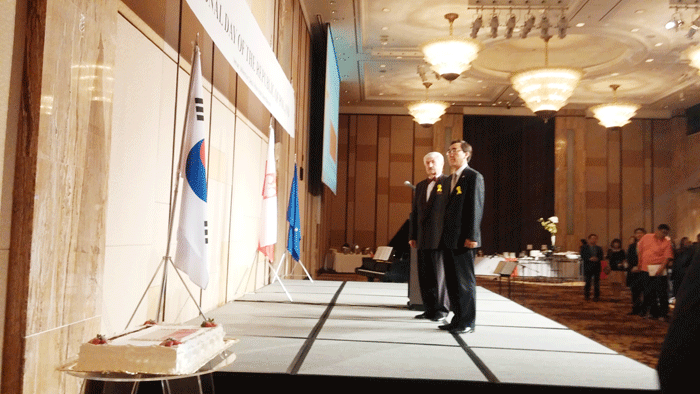
This year marks the 25th anniversary of diplomatic relations between Korea and Poland. During the past quarter of a century, our relations have strengthened across-the-board. In particular, the establishment of a strategic partnership between our two countries agreed upon during President Komorowski’s state visit to Korea last October opened a new chapter in the annals of our bilateral relations.
Today, Poland is one of Korea's biggest trading partners among EU members. In 2013, Korea's import from Poland increased by almost 50 percent. As such, our two-way trade has been growing not only quantitatively, but also qualitatively, moving towards a balanced expansion.
In the area of security as well, our bilateral cooperation is strong and solid. Poland is a member of the Neutral Nations Supervisory Commission (NNSC), which has made great contributions to the peace and stability on the Korean Peninsula for the past sixty years. It has also been a strong supporter for Korea in all our efforts to build an infrastructure of trust and cooperation on the Korean Peninsula.
As you know, during her visit to Germany last March, President Park Geun-hye presented the Dresden Initiative which set out the future vision of a reunified Korea contributing to global peace and prosperity. As Poland has transformed itself from a stronghold of communism to become today's icon of European peace, the Korean Peninsula -- the last remaining legacy of the Cold War--will someday become an icon of peace in Northeast Asia.
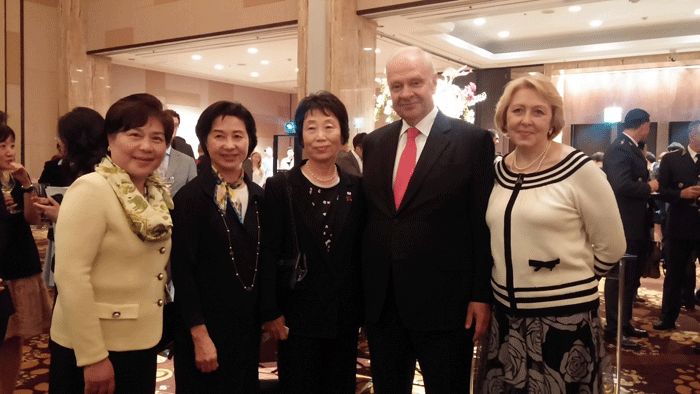
I am confident that Poland will continue to be our close partner in our journey towards a new kind of Korean Peninsula.
I would like to close my brief remarks by congratulating you once again for the May 3rd Constitution Day of Poland, and wishing for an enduring partnership between our two countries.
*(The Korea Post consists of four media units, namely one English print monthly, one English E-daily, one English Internet daily and one Korean-language Internet edition.)
